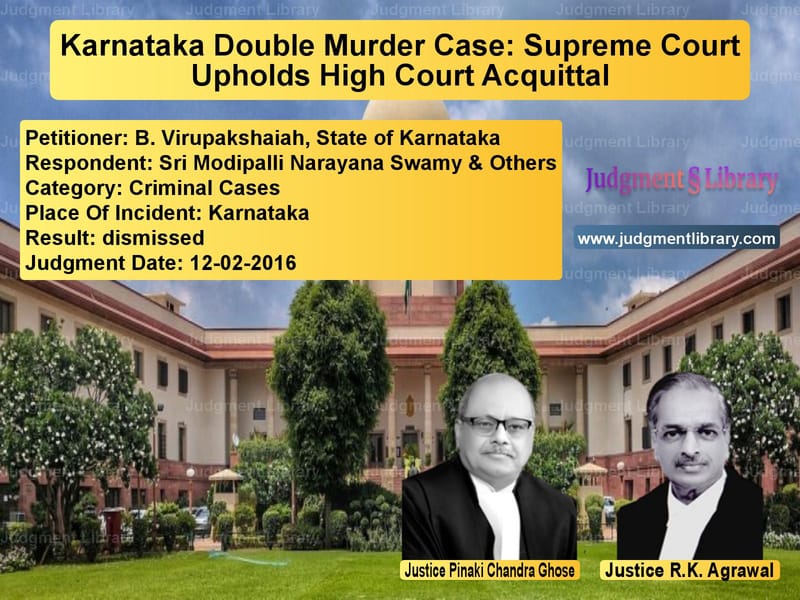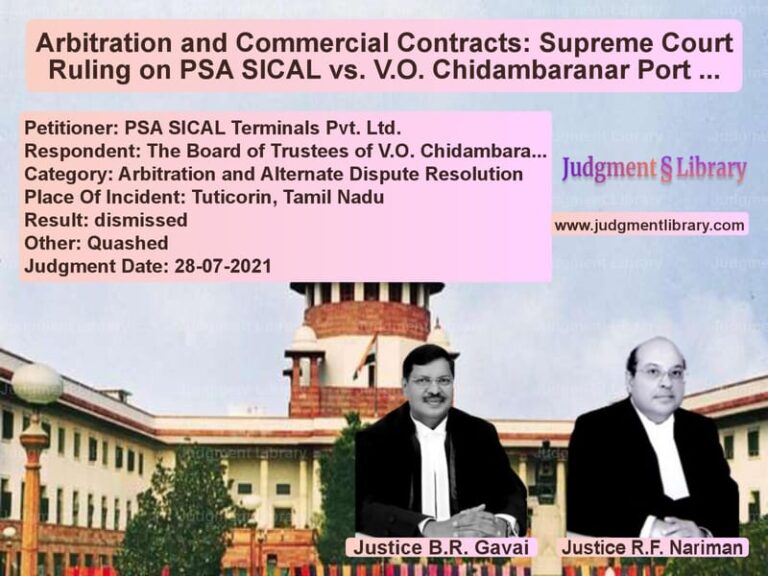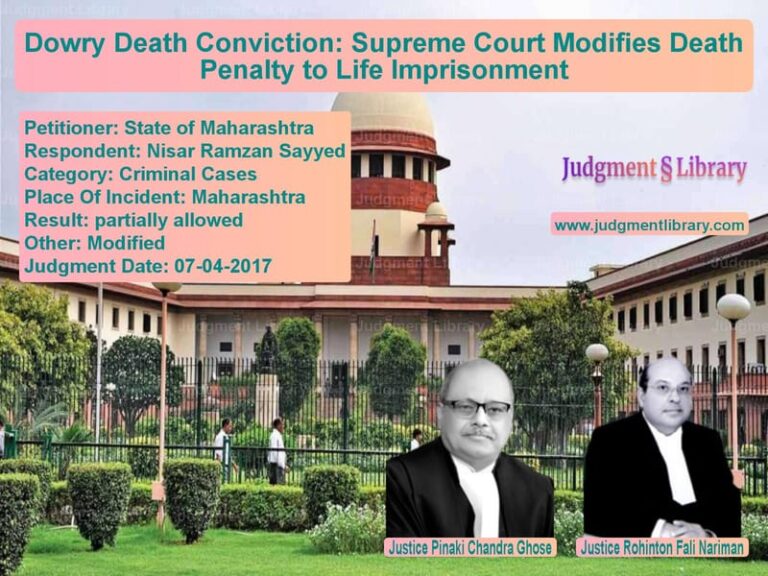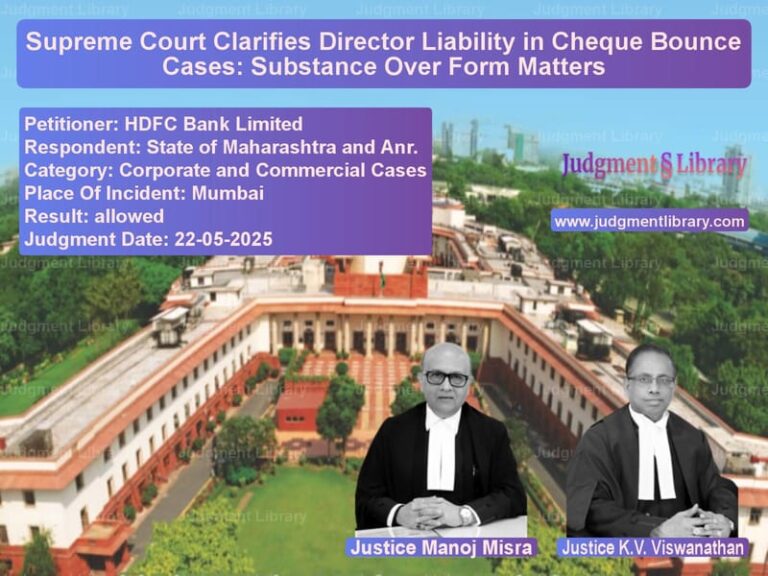Karnataka Double Murder Case: Supreme Court Upholds High Court Acquittal
The case of B. Virupakshaiah vs. State of Karnataka & Others and State of Karnataka vs. Sri Modipalli Narayana Swamy & Others deals with the double murder of Bheemaneni Kondaiah and his driver, Pavadappa, allegedly due to a conspiracy hatched for revenge. The Supreme Court examined whether the Karnataka High Court was justified in acquitting all accused due to inconsistencies in witness testimonies and lack of substantive evidence.
Background of the Case
On November 22, 2005, an FIR was registered at Toranagallu Police Station following a violent attack on a Tata Indica car traveling on NH-63. According to the prosecution:
- A Bolero Jeep intentionally rammed into the Tata Indica car.
- Four armed assailants pulled out the two occupants and brutally attacked them with sharp weapons.
- Bheemaneni Kondaiah died on the spot, while his driver, Pavadappa, succumbed to injuries on the way to the hospital.
- The assailants escaped towards Bellary.
The incident was allegedly linked to a long-standing feud, where the deceased were suspected of involvement in the earlier murders of four relatives of the accused.
Trial Court Proceedings
After investigation, the prosecution charged twelve accused under:
- Section 302 IPC – Murder
- Section 341 IPC – Wrongful restraint
- Section 143 IPC – Unlawful assembly
- Section 147 IPC – Rioting
- Section 148 IPC – Rioting with deadly weapons
- Section 120B IPC – Criminal conspiracy
- Section 149 IPC – Common object
On April 8, 2010, the Trial Court convicted all twelve accused, sentencing them to life imprisonment based on:
- Eyewitness testimonies of PW1, PW4, PW5, and PW6.
- Recovery of weapons allegedly used in the crime.
- Statements suggesting a premeditated conspiracy.
High Court’s Judgment
The convicted accused appealed to the Karnataka High Court, which overturned the trial court’s verdict on January 19, 2011, citing:
- Major inconsistencies in eyewitness testimonies.
- Failure to establish a conspiracy beyond a reasonable doubt.
- Unreliable recovery of weapons and vehicles.
- Absence of direct evidence linking the accused to the crime.
The High Court granted benefit of doubt and acquitted all accused.
Petitioners’ Arguments (State of Karnataka and Complainant)
The prosecution contended:
- Eyewitness testimonies clearly identified the accused and described their actions.
- Weapons and vehicles recovered confirmed the accused’s involvement.
- The accused had a strong motive, as the victims were responsible for the prior killings of their relatives.
- The High Court ignored crucial evidence in acquitting the accused.
Respondents’ Arguments (Accused)
The defense countered:
- The prosecution witnesses gave contradictory statements, making their testimony unreliable.
- The number of assailants described by different witnesses varied, raising doubts about their credibility.
- The alleged recovery of weapons and vehicles was not proven beyond doubt.
- There was no concrete proof of a conspiracy, as most statements were hearsay.
Supreme Court’s Analysis
1. Reliability of Eyewitness Testimonies
The Supreme Court analyzed key witness depositions:
- PW2 and PW3 were security guards at the Aqua Minerals Factory near the crime scene but could not identify the accused.
- PW1, PW4, PW5, and PW6 described the incident differently, including different counts of assailants.
- PW6, despite being an alleged eyewitness, admitted he could not recognize the attackers.
- The police were present shortly after the incident, yet the witnesses remained silent.
The Court ruled that material alterations in statements made the testimonies unreliable.
2. Alleged Conspiracy and Motive
The prosecution argued that the attack was revenge for the previous murders of the accused’s relatives. However:
- None of the prosecution witnesses directly linked the accused to a conspiracy.
- PW46, PW47, and PW48 initially supported the prosecution but turned hostile during cross-examination.
- Key prosecution witnesses admitted that they heard about the conspiracy but had no direct knowledge.
The Court ruled that the prosecution failed to establish a conspiracy with credible evidence.
3. Recovery of Weapons and Vehicles
The prosecution claimed that weapons and vehicles used in the crime were recovered from the accused. However:
- The Forensic Science Laboratory report did not conclusively link the weapons to the crime.
- Witnesses to the recovery process turned hostile.
- Investigating officers could not clearly establish ownership of the recovered weapons.
The Court found that the recovery was not proven beyond reasonable doubt.
Final Judgment
The Supreme Court dismissed the appeal and upheld the High Court’s acquittal, ruling:
- The prosecution’s case suffered from serious inconsistencies in witness testimonies.
- The alleged conspiracy was not proven beyond doubt.
- The recovery of weapons and vehicles was unreliable.
- The accused were entitled to the benefit of doubt.
Impact of the Judgment
This ruling reinforces key legal principles:
- Courts must carefully scrutinize witness statements to ensure reliability.
- Alleged conspiracies must be proven with direct evidence, not hearsay.
- The prosecution must prove identity and intent beyond a reasonable doubt.
- Procedural lapses in recovery can weaken a case.
Conclusion
The Supreme Court’s decision in B. Virupakshaiah vs. State of Karnataka underscores the importance of rigorous evidence scrutiny in criminal cases. While justice for victims is vital, courts must ensure that convictions are based on credible and consistent evidence, preventing wrongful convictions due to procedural lapses.
Don’t miss out on the full details! Download the complete judgment in PDF format below and gain valuable insights instantly!
Download Judgment: B. Virupakshaiah, St vs Sri Modipalli Naraya Supreme Court of India Judgment Dated 12-02-2016-1741852615055.pdf
Direct Downlaod Judgment: Direct downlaod this Judgment
See all petitions in Murder Cases
See all petitions in Attempt to Murder Cases
See all petitions in Bail and Anticipatory Bail
See all petitions in Judgment by Pinaki Chandra Ghose
See all petitions in Judgment by R K Agrawal
See all petitions in dismissed
See all petitions in supreme court of India judgments February 2016
See all petitions in 2016 judgments
See all posts in Criminal Cases Category
See all allowed petitions in Criminal Cases Category
See all Dismissed petitions in Criminal Cases Category
See all partially allowed petitions in Criminal Cases Category







